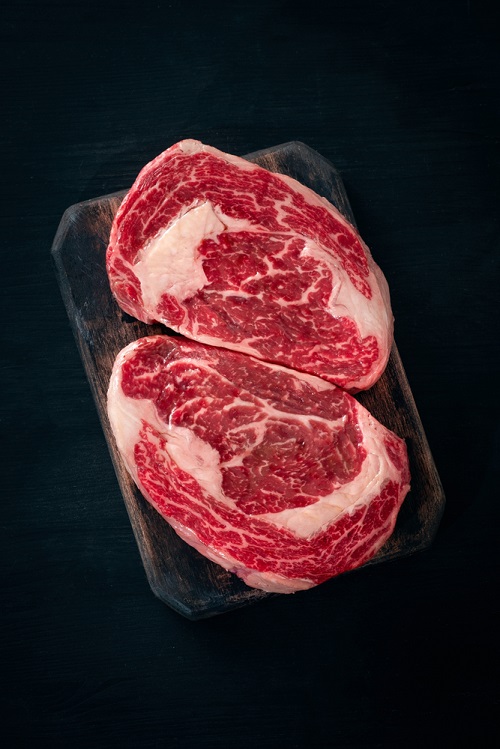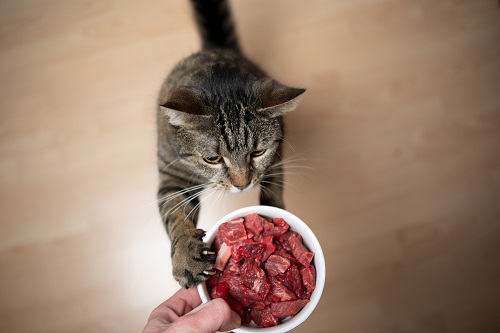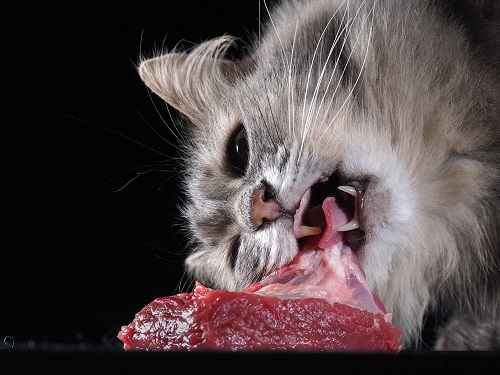Can Cats Eat Raw Beef? From benefits to risks, our guide breaks down everything you need to know before feeding your kitty this meat.
As a cat owner, you may be wondering if raw meat is on the menu. While some people swear by the benefits of a raw food diet for cats, others caution against the potential risks of feeding raw meat. So, Can Cats Eat Raw Beef? The answer is not a simple “yes” or “no.” In this article, we will explore the pros and cons of feeding raw beef to cats and provide tips for ensuring your pet’s health and safety.
Can Cats Eat Beef Jerky? Find out here
What Is Raw Beef?

Raw beef refers to uncooked, unprocessed meat from cattle, typically used for cooking or processing into various meat products such as ground beef, steaks, and roasts. It can come from different parts of the animal, including the muscle, organs, and bones, and can be consumed in various forms such as tartare, carpaccio, or other dishes that are served raw or lightly cooked. However, it is important to handle and prepare raw beef properly to avoid the risk of foodborne illness.
Can Cats Eat Raw Beef?
Yes, Cats can eat raw beef.
Raw beef can be a suitable protein source for cats, but it’s essential to take some precautions. Feeding raw beef to your feline companion carries the risk of bacterial contamination, such as Salmonella or E. coli, which can lead to gastrointestinal issues and even serious illness.
To minimize the risk, ensure that the raw beef is fresh, sourced from a reliable supplier, and handled hygienically. Do remember that raw beef can provide essential nutrients like protein and taurine; it alone will not meet all of a cat’s nutritional requirements.
Consult with a veterinarian or a pet nutrition expert to create a balanced and appropriate diet plan for your cat, which may include raw beef as a part of a more comprehensive meal plan.
Is Raw Beef Good For Cats?

Raw beef is generally safe and non-toxic for cats to consume. Providing a source of high-quality protein, raw beef helps maintain strong muscles, a healthy immune system and supports overall growth and development.
Moreover, the unprocessed nature of raw beef offers essential nutrients, such as taurine, which plays a crucial role in maintaining your cat’s vision, digestion, and heart function.
However, it is crucial to practice proper food safety and hygiene when handling raw beef to minimize the risk of bacterial contamination. Consult with a veterinarian before making any significant changes to your cat’s diet to ensure its specific needs are met.
Does Raw Beef Contain Any Nutritional Value For Cats?
- Taurine Content: Raw beef contains taurine, an essential amino acid that supports healthy vision, heart function, and reproductive health in cats.
- Proteins: An excellent source of protein, which is essential for maintaining muscle mass and supporting healthy growth and development in cats.
- Low in Carbohydrates: Raw beef is naturally low in carbohydrates, aligning with a cat’s carnivorous diet and helping maintain a healthy weight.
- Vitamins and Minerals: It contains a variety of vitamins and minerals that are important for overall health, such as vitamins B12, A, and D, iron, zinc, selenium, and phosphorus.
- Dental Health Benefits: Chewing raw meat can improve a cat’s dental health by reducing plaque buildup and exercising their jaw muscles.
- Healthy Fats: The amino acids and essential fatty acids present in raw beef can promote healthier skin and a shinier coat in cats.
Risks Of Feeding Raw Beef To Cats

- Bacterial Contamination: Raw beef can be contaminated with bacteria such as Salmonella or E. coli, which can cause foodborne illness in cats.
- Nutritional Imbalances: Feeding only raw beef or an unbalanced raw food diet may lead to nutritional deficiencies or excesses, which can have negative health effects over time.
- Allergic Reactions: Some cats may be allergic to beef or other ingredients in raw food, which can cause digestive upset, skin rashes, or other symptoms.
- Choking Hazards: Large pieces of raw beef can present a choking hazard for cats, particularly if they are not chewed properly.
- Tooth Damage: Chewing on hard bones or cartilage in raw beef can cause dental fractures or other damage to a cat’s teeth.
- Increased Risk of Parasitic Infection: Raw beef can potentially contain parasites such as tapeworms or roundworms, which can be harmful to cats and difficult to detect.
Signs Of Allergies In Cats After Eating Raw Beef
- Vomiting
- Diarrhea
- Skin rashes and itching
- Sneezing
- Coughing
- Runny nose and eyes
- Swelling of the face, ears, and paws
- Difficulty breathing
- Loss of appetite
- Lethargy
- Weakness
- Increased thirst
- Increased urination
- Behavioral changes
If you suspect that your cat may be having an allergic reaction to raw beef or any other food, it is important to seek veterinary care as soon as possible.
Can Cats Raw Beef? Quick Takeaways!
- Cats can eat raw beef, but it must be served in limited quantities, ensuring proper hygiene.
- Raw beef is not toxic for cats, but the possible presence of bacteria and added flavors in it can be harmful to felines.
- Raw beef is a nutritious food source for cats, as it contains essential amino acids, proteins, vitamins, minerals, and healthy fats, all of which contribute to their overall health and well-being.
- Feeding raw beef to cats can pose several risks, including bacterial contamination, nutritional imbalances, allergic reactions, choking hazards, tooth damage, and an increased risk of parasitic infection.
- Some of the symptoms of raw beef allergies in cats include digestive issues, breathing issues, and appetite changes.
- It is advised to consult a veterinarian before making changes to a cat’s diet.



